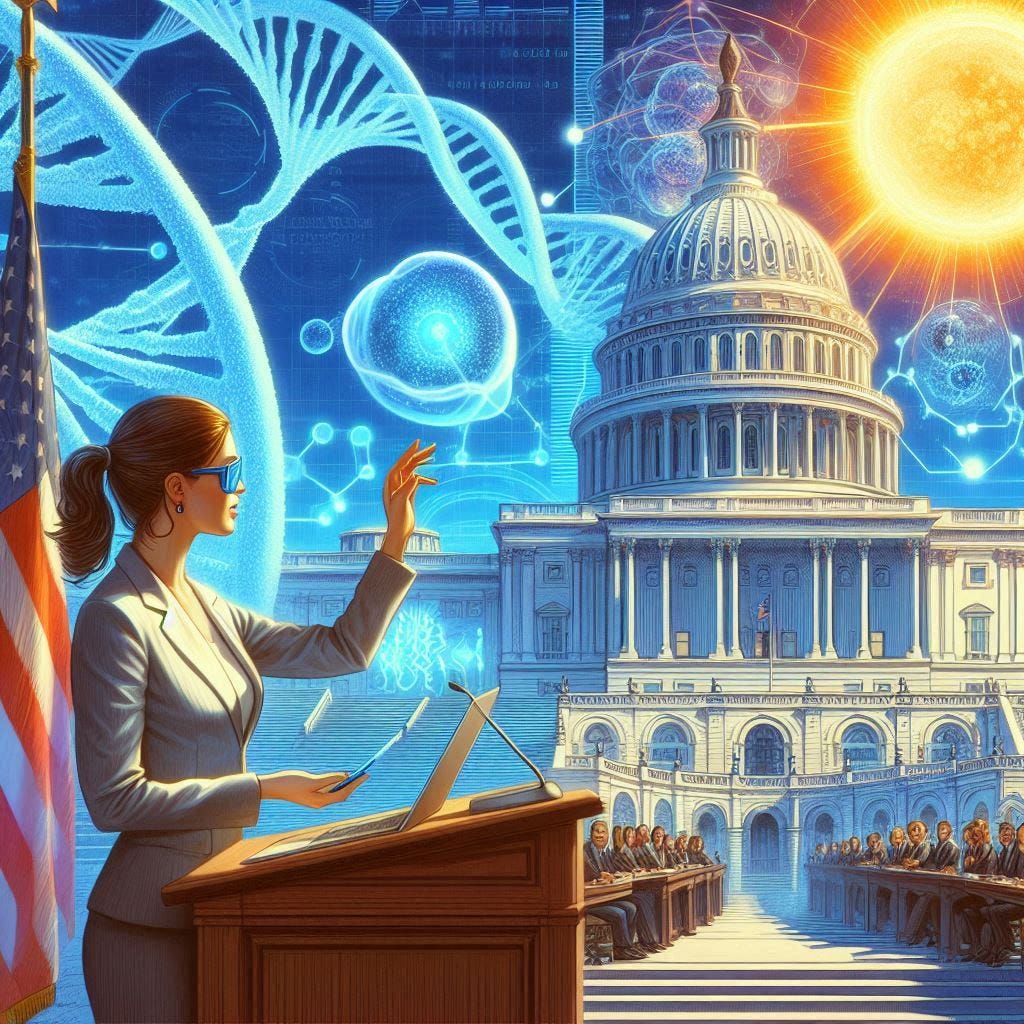Laws of Nature
The halls of Congress were a stark contrast to the cramped lab setting Dr. June Rousseau was familiar with. The air hummed with a nervous energy as she felt the nation's attention pressing down on her. June, her expression resolute, stood before the Congressional committee. She felt her heart pounding.
"Dr. Rousseau," the committee chairman's voice boomed throughout the hall. "We appreciate your willingness to testify today on House Bill 628, which would allow for exemptions to the federal ban on human gene modification."
June nodded as her gaze swept across the faces of the assembled politicians. Some eyes looked sympathetic while others seemed to hold outright hostility. She took a deep breath and recited the opening she spent the last week memorizing.
"Thank you, Chairman," she said steadily. "I'm here today to advocate for those suffering from Omnicroix Syndrome, which is a rare yet devastating genetic disorder that robs children of their futures."
There was a murmur through the room. She wanted those words to settle. She then projected a holographic image above the committee table depicting the intricate double helix of DNA, with a series of genes glowing red.
"This," she pointed, "is the genetic anomaly responsible for Omnicroix Syndrome. It disrupts the production of essential neurotransmitters, leading to progressive neurological degeneration."
She continued her statement, explaining the syndrome's harrowing symptoms, translating the complex scientific jargon into layman's terms. She painted a vivid picture of a child's rapid decline -- their loss of motor skills, the gradual failing of cognitive function, and the inevitable descent into a vegetative state.
"Gene editing," she continued, her voice ringing with conviction, "offers us a chance to silence these defective genes, and to halt this cruel disease. We have a technology today with immense potential, not just for Omnicroix but the countless other genetic diseases that plague humanity."
---
The gavel fell, echoing through the chamber as the vote tally illuminated on the overhead screen. The bill had failed by a single dissenting vote, Senator Neil Cleveland, a towering figure with a reputation for unwavering conservatism. He rose from his seat.
"My esteemed colleagues," his voice laden with gravitas. "I stand before you today with a heavy heart. I cannot support this bill in good conscience. While it may sound just on its face, it is a Pandora's Box in disguise."
He paused, letting his words hang in the air. "Gene editing, with undoubtedly a powerful tool, is a double-edged sword. It holds the promise of curing disease, but with the potential for irreversible harm. We tread a dangerous path when we tamper with the very essence of life, the divine blueprint that makes us human."
He turned, making sure to face the camera in the back of the chamber streaming his speech to the nation. "I understand the desperation of those facing genetic disorders, the yearning for a cure. But we must not allow compassion to blind us to the ethical quagmire which lies ahead. Once we open this door, there's no way to go back. We risk creating a world where genetic enhancements become the norm, where the wealthy can purchase perfection."
A hush fell over the chamber as he concluded his speech. June's heart sank. The bill was dead, her hopes dashed against the unyielding wall of tradition and fear.
---
The gentle sway of the train lulled June into a melancholy trance as the cityscape of DC receded into the distance. The Capitol dome had once been a beacon of hope for her, but now was a cruel symbol of her defeat. The bill's failure weighed heavily on her, as did the finality of the senator's words.
She rested a hand on her still-flat belly, a gesture of comfort and silent apology. Within her grew a life; a precious, fragile life threatened by the very genes that connected them. The thought of her daughter's potential future, marred by Omnicroix Syndrome, sent a shiver down her spine.
"I failed you," she whispered, not even loud enough for her seatmate to hear. "I couldn't change the world for you."
June closed her eyes and thought of the vibrant lab she had left behind. It was a sanctuary of scientific exploration, a place where the mysteries of life could be identified and solved using tools and reason. Now, it was nothing more than a hollow shell, its promises overshadowed by the stark reality of political intransigence.
She thought about her brilliant colleagues working tirelessly to unlock the secrets of the human genome. Their research held the keys to countless cures, ushering in an era free of genetic disease. But if their progress continued to be stifled, their potential would be constrained by fear.
A tear slid down her cheek and she turned towards the window. Beneath her sadness, a spark of defiance remained. She was a scientist, a fighter, and soon a mother. She couldn't surrender to the darkness, not while a glimmer of hope remained. The battle for her daughter's future was far from over.


